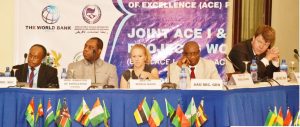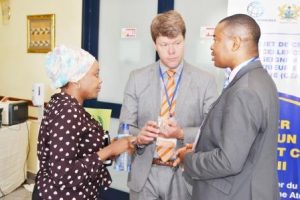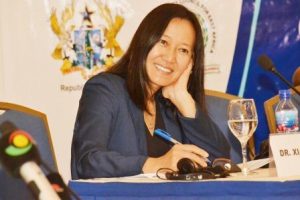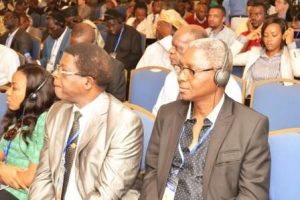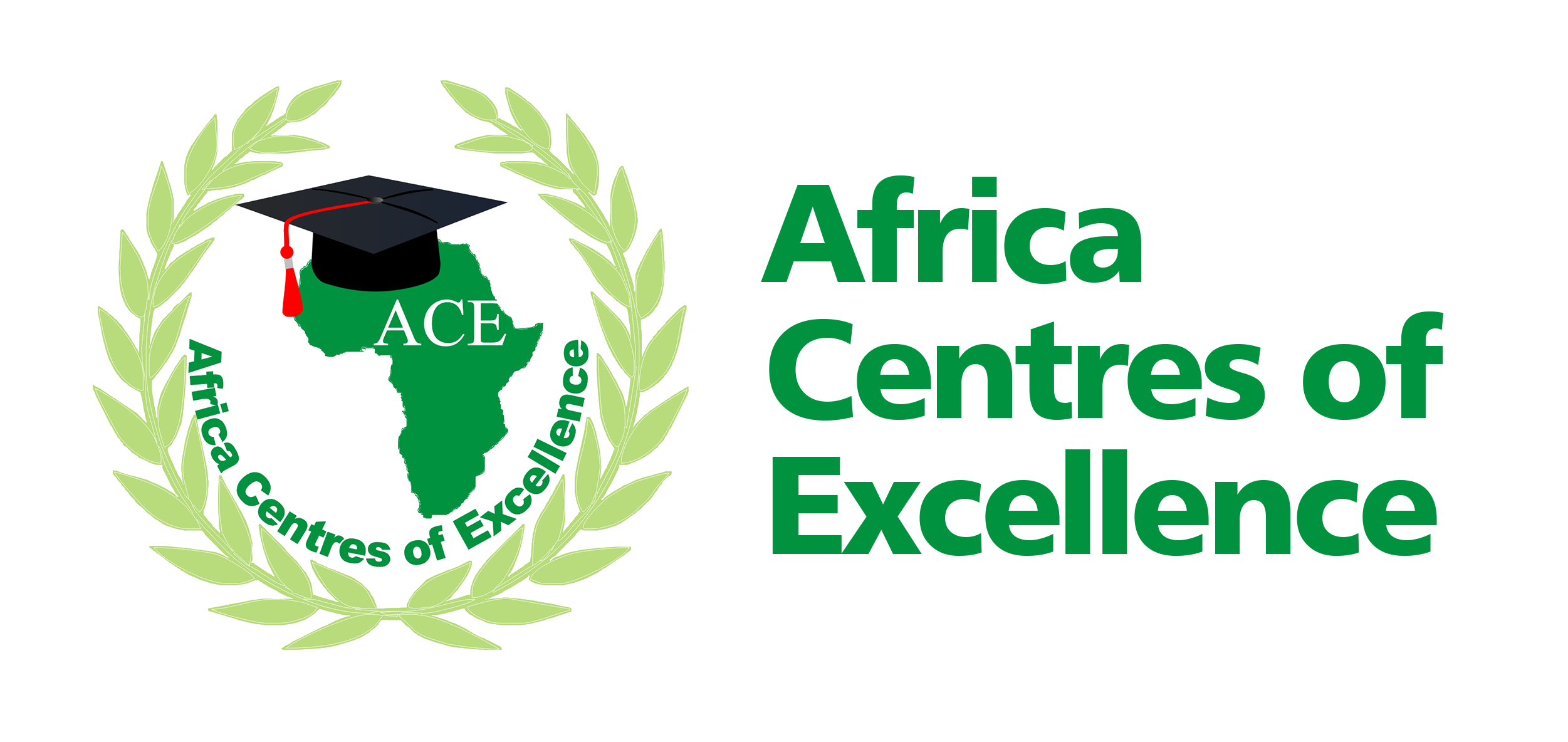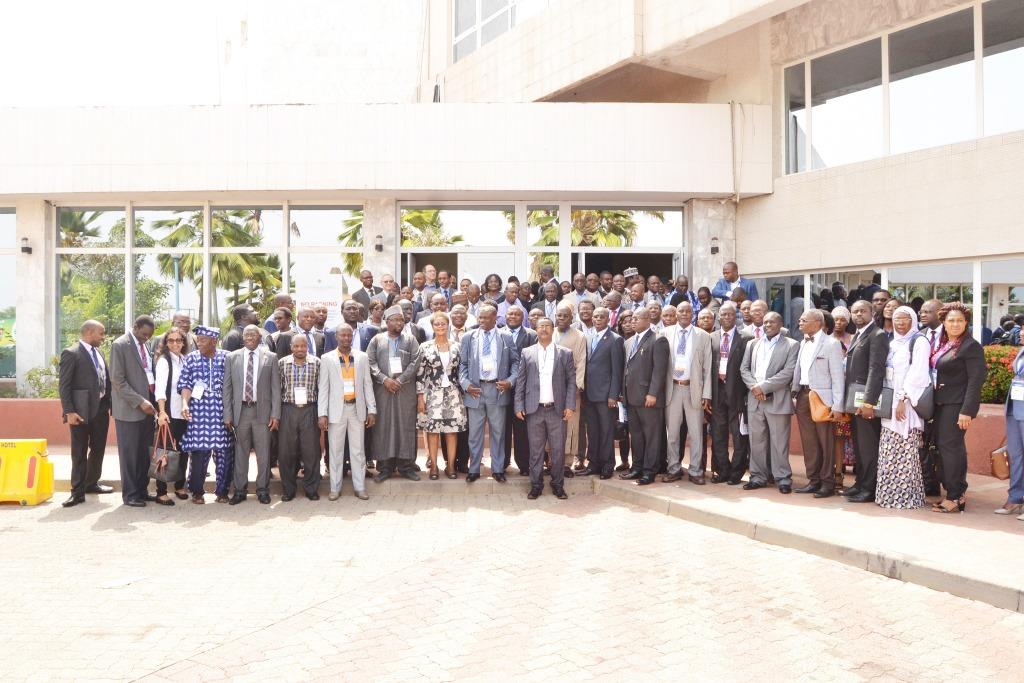The World Bank-supported Africa Centres of Excellence (ACE) Project, which took off in West and Central Africa, in
2014, has been extended to East and Southern Africa in the second phase, tagged ‘ACE II’, while the former has also
been tagged ‘ACE I’.
Building on the success of ACE I, where 22 Centres were established in West and Central Africa, 24 Centres have
been established in East and Southern Africa, with the same aim of promoting regional specialisation among
participating universities across the continent, in areas that address specific common regional development challenges.
These areas include Agriculture, Health, Science, Technology, Engineering and Mathematics.
In order to bring them all together for a project review and to learn from each other’s experiences, no fewer than 350
participants, drawn from 22 countries, converged on the La Palm Royal Beach Hotel, Accra, Ghana, for the first joint
ACE I and ACE II project Workshop, which opened on 7th November, 2017. The three-day Workshop was the 8th for
ACE I and 3rd for ACE II. It was officially opened by the Minister of Education, Republic of Ghana, Honourable Dr.
Matthew Opoku Prempeh.
Participants, experts and partners were drawn from Benin Republic, Burkina Faso, Cameroon, China, Cote d’Ivoire,
Denmark, Ethiopia, France, The Gambia, Ghana and Kenya. Others were Malawi, Mozambique, Nigeria, Rwanda,
Senegal, Tanzania, Togo, Uganda, United States of America, Zambia and Zimbabwe.
In his welcome remarks, World Bank Regional Team Lead, Mr. Andreas Blom, thanked the Ghanaian government
and the Local Organising Committee (LOC) for hosting the workshop, which he described as “a pool where there is so
much to learn and exchange.” He also thanked all academic experts present for their efforts and contributions, saying
that the World Bank’s aim is their success and the Project is only successful with the success of each Centre.
Mr. Blom noted that the ACE Project had come a long way and was making fantastic progress having been on for five
years with a total of 46 Centres established, 18 governments participating and more than 1,000 students educated.
However, he said, real development could only be measured by available skills and knowledge. He stressed that
corruption was ugly and advised that project funds should be strictly used for student learning, new laboratories and
equipment. With this, he thanked many of the Centres for their clean Procurement Reports.
The Task Team Lead enjoined the Ministers in charge of higher education to take ownership of the Projects and the
Universities to keep them updated, while also stressing the need for collaboration between the Vice-Chancellors and
the Centres. Since the financing of the Project is based on results, he said, full ownership of the Project by all parties
would ensure its success. He urged the Universities and Centres to ensure quality and relevant research, keep to the
academic calendar and provide resources for study and the laboratories. He also called for more efforts towards
earning international accreditation for the Centres’ programmes.
The World Bank Task Team Leader, East and South Africa, Dr. Xiaoyan Lang, acknowledged the presence of the
Association of African Universities (AAU), the 46 Centres and other participants. She noted that only 36% of those
who should be in secondary schools in Africa were enrolled, while only 10% of those enrolled were both elites and
male. The continent has children not in school and not learning as well as the lowest number of researchers and low
research and development (R&D), among other indices. Africa, she said, could use its shining stars in higher
education.
Dwelling on the new addition to the ACE family, Dr. Lang said that ACE II had progressed where all the countries
had become effective, with a total of 58 programmes and 84 MoUs signed with global institutes and the private sector.
Collectively, ACE II has agreed to include the private sector in the Project. But the Project is not without its
challenges, which include balance with the Centre, University governance and policy, sustainability, accreditation,
attracting students and corruption. She reminded plenary that the success of the Project depended on each Centre.
Also speaking at the opening ceremony, Secretary General of the Association of African Universities (AAU),
Professor Etienne Ehouan Ehile, expressed gratitude of the Association and the World Bank to the Government of
Ghana for its continuous support to the Project and for hosting the ACE Project Workshop for the second time.
Prof. Ehile said, though substantial progress had been made since the last Project Workshop in Lagos, in the areas of
supervisory missions, national review meetings, monitoring and evaluation as well as verification of results, there still
remained a lot to be done by all stakeholders to ensure the full realisation of the ACE Project’s goals.
In his remarks, Executive Secretary of the Inter-University Council of East Africa (IUCEA), Professor Alexandre
Lyambabaje, who was represented by his Deputy, Professor Mike Kuria, said the ACE project gives an opportunity
for hope. He stressed that the destiny of Africa is in the hands of Africans and that the ACEs are beacons of hope, the
success of which Universities could use as benchmarks. He assured the plenary that “the journey is long and the speed
is slow, but we will get there.”
The World Bank Country Director, Ghana, Sierra Leone and Liberia, Mr. Henry Kerali, commended governments and
the representatives of the various countries for their demonstrated commitment and ownership of the ACEs. While
assuring them of World Bank’s commitment to African higher education, Mr. Kerali stated that the Project was quite
unique in the World Bank portfolio and was paving the way to re-thinking how the Bank could support higher
education and advance research in Africa. According to him, the ACE Project had gained a high level of international
and local attention from key partners, industry players, and stakeholders on the African continent and beyond.
The Ghanaian Minister of Education assured Centre Leaders and their teams that government recognised their efforts
and stood ready to assist them to build the legacy that would endure long after the Word Bank support. The Project
strategy, he said, was extremely laudable, and had the full endorsement of government.
The Minister challenged the Centres to drive change as principal producers of knowledge, while appealing to other
institutions, both public and private, to start positioning themselves to develop competitive proposals that would earn
them slots in the next round of call for proposals to establish more Centres.
Also present at the opening were the Gambian Minister of Higher Education, Research, Science and Technology, Mr.
Badara A. Joof; Project Coordinator ACE II, IUCEA, Dr. Eugene Mutimura and Project Coordinator ACE I, AAU,
Prof. Jonathan Mba.
The Workshop had plenary and break-out sessions, which featured the presentation of progress reports on the Centres,
interventions by subject matter experts, representatives of the Centres and their partners as well as parallel networking
sessions. It was rounded off with site visits to the West African Centre for Crop Improvement (WACCI) and West
African Centre for Cell Biology of Infectious Pathogens (WACCBIP).
